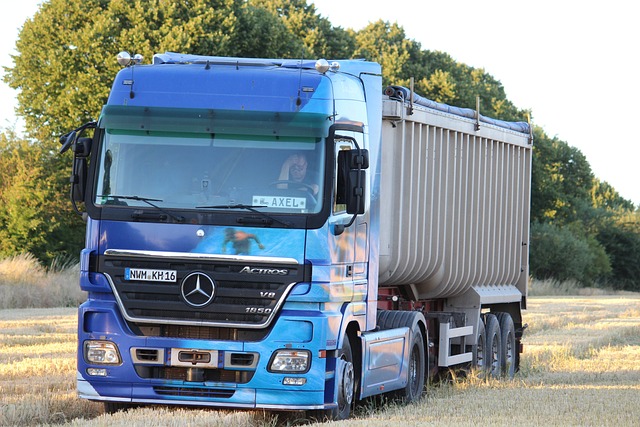Delivery trucks require specialized delivery truck insurance to mitigate risks, including liability for damages/injuries, collision protection, and cargo insurance. A comprehensive policy protects against financial losses from accidents, theft, or damage, with key components like liability, physical damage, cargo, and business interruption coverage. Best practices include regular maintenance, driver training, adherence to regulations, and defensive driving techniques. Reputable insurers offer tailored solutions like liability protection, cargo coverage, and roadside assistance, ensuring efficient claims processes and operational safety in the dynamic field of delivery and transport.
In the fast-paced world of delivery services, efficient logistics and robust safety measures are paramount. This article delves into the essential policies and strategies for insuring delivery and transport vehicles, a key aspect often overlooked but crucial for businesses. We explore critical components of delivery truck insurance, best practices to mitigate risks, and navigating legal complexities, offering valuable insights to ensure smooth operations and financial protection. Understanding these guidelines is imperative for any business aiming to excel in the competitive delivery sector.
- Understanding Delivery Truck Insurance Requirements
- Key Coverage Components for Delivery Vehicles
- Mitigating Risks: Safety Measures and Best Practices
- Navigating Claims and Legal Considerations
Understanding Delivery Truck Insurance Requirements

Delivery trucks, given their crucial role in the logistics chain, require specialized insurance coverage to mitigate risks associated with operation and cargo transport. Understanding the specific needs is key to ensuring comprehensive protection. Delivery truck insurance encompasses several essential components, including liability coverage for damages or injuries caused during delivery, collision insurance to safeguard against accidents, and cargo insurance to protect the goods being transported.
Business owners must also consider additional protections like personal injury coverage for on-the-job incidents involving drivers and employees, as well as comprehensive and collision coverage options that extend beyond standard policies. Navigating these requirements involves consulting with insurance professionals who can tailor policies to fit the unique operational needs of delivery fleets, ensuring compliance while optimizing cost-effectiveness.
Key Coverage Components for Delivery Vehicles

When it comes to insuring delivery trucks, a comprehensive policy is essential to mitigate risks and ensure business continuity. Key coverage components include liability insurance, which protects against claims for property damage or personal injury caused during delivery operations. This is crucial as it shields businesses from financial loss in case of accidents or incidents involving third parties. Additionally, physical damage coverage safeguards the actual delivery truck from perils such as collisions, theft, and vandalism, ensuring that repairs or replacements can be made promptly.
Further essential elements include cargo insurance to protect the goods being transported, especially for high-value or fragile items. This covers loss or damage during transit, providing peace of mind and financial security. Also, consider coverage for business interruption, which compensates for lost income and ongoing expenses if a delivery truck becomes disabled or damaged, preventing normal operations. These comprehensive insurance options form the backbone of effective risk management strategies for delivery truck operators, ensuring they’re prepared for potential challenges on the road.
Mitigating Risks: Safety Measures and Best Practices

In the dynamic landscape of delivery and transport, mitigating risks is paramount for businesses aiming to protect their assets and maintain operational efficiency. For delivery trucks, this involves a multifaceted approach starting with comprehensive insurance coverage. Delivery truck insurance plays a crucial role in shielding against financial losses stemming from accidents, theft, or damage. Beyond insurance, implementing best practices such as regular vehicle maintenance, driver training, and adherence to traffic regulations is essential.
These safety measures don’t merely comply with legal requirements; they actively reduce the likelihood of incidents that could disrupt service, compromise goods, and endanger lives. Regular inspections, for instance, identify potential mechanical issues before they escalate into costly repairs or safety hazards. Equally vital is empowering drivers with defensive driving techniques and knowledge of hazard recognition, enabling them to navigate roads responsibly and minimize risks.
Navigating Claims and Legal Considerations

Navigating Claims and Legal Considerations is a critical aspect of managing delivery and transport vehicles. Ensuring comprehensive delivery truck insurance is paramount to protect against potential losses, damages, or liabilities that may arise during operations. This includes coverage for accidents, cargo damage, and third-party injuries. By understanding and adhering to legal requirements, businesses can mitigate risks and streamline the claims process.
Regular reviews of insurance policies are essential to ensure they align with evolving regulations and business needs. Engaging with reputable insurance providers who specialize in delivery truck insurance can offer tailored solutions, including liability protection, cargo coverage, and roadside assistance services. Proactive risk management strategies, combined with robust insurance plans, enable efficient navigation through claims processes and foster a safer operational environment.
Expert policies for delivery and transport vehicles are essential in mitigating risks, ensuring safety, and navigating legal complexities. By understanding the key coverage components, implementing best practices, and promptly addressing claims, businesses can revolutionize their logistics operations. Delivery truck insurance isn’t just a requirement—it’s a strategic investment in the longevity and success of your delivery fleet.
